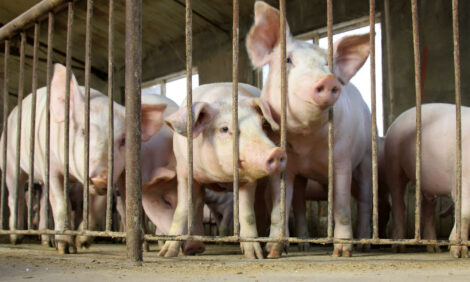



Prop. 2 Will Raise Humane Standards
CALIFORNIA - The Californian ballot on 4 November is a measure entitled 'Standards for Confining Farm Animals', or Proposition 2 (Prop. 2). A full-time California farmer and rancher explains why he supports this reform and encourages his fellow Californians to vote 'yes' on this initiative.Prop. 2 will ensure that egg-laying hens, veal calves and breeding pigs will be able to stand up, lie down, turn around and extend their limbs. It really is that basic, writes Bill Niman in SFGate.
He continues, this is why the California Veterinary Medical Association, United Farm Workers and Humane Society of the United States, along with many others, support the measure.
There is simply no excuse for confining farm animals in tiny cages where they cannot even turn around or extend their limbs. Unfortunately, such misery is the daily reality for millions of animals in our state. All animals, including farm animals, deserve a decent life. Such a life is impossible for animals confined or tethered so extremely they can barely move for months on end.
The agribusiness companies funding Prop. 2's opposition would have us believe that the measure will hurt farmers and ranchers. In fact, those corporations have a history of driving family farmers out of business and, in my view, have often demonstrated indifference toward the welfare of animals.
Don't be fooled. Many California family farmers support a yes vote on Prop. 2. We know that better farming practices are not only better for animals, they also enhance food quality and safety. In fact, more than 100 California family farmers have signed on in support of Prop. 2.
Such concerns for animal welfare, the environment, and food safety were validated when the prestigious Pew Commission on Industrial Farm Animal Production - an independent panel on which I served along with other ranchers, veterinarians, governors and the former U.S. Secretary of Agriculture - affirmed that Prop. 2 includes "the types of modest animal welfare public policy improvements that the commissioners recommend implementing."
Through my own experience of raising animals and hundreds of visits to farms over the past 35 years, I have learned a lot about animals and how to raise them. I've been deeply dismayed to witness the rise of factory-style methods that confine farm animals in ways wholly unconnected with nature and defying any common sense method of good animal husbandry.
This is especially true for battery-cage egg-laying factories and industrial-style pig production. Pigs are highly intelligent and sensitive creatures. It's widely recognized that they're as clever as dogs, maybe more so. I've known of pigs who learned how to open gates. In natural settings, pigs are attentive and nurturing mothers who take great care in preparing for the arrival of their newborns. I've observed plenty of sows getting ready to give birth. They spend hours - even days - making ready a special spot for themselves and their piglets. If a sow has access to sticks, branches or tall grasses, she will spend that time building an elaborate nest for her young. But in industrial-style confinement pig operations, none of this is possible. The harsh confinement in factory farming frustrates the pigs' most important instincts, leaving them unable to turn around or stretch their limbs, much less build a nest. Prop. 2 doesn't require farmers to adopt the high standards I consider appropriate for animal farming. It's a modest measure that merely says confinement cannot be so severe that animals are unable to turn around or extend their limbs.
Mr Niman concludes, "Whatever you might hear in the debate over Prop. 2, remember that many California family farmers support it. Like our fellow citizens, we deplore cruelty and welcome the elevation of standards for animal farming. California can do better and voting yes on Prop. 2 is a good start."






